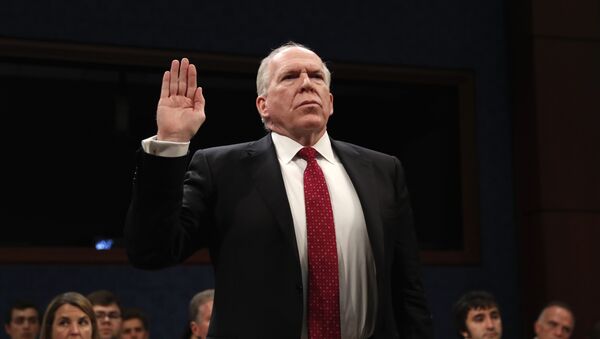Aaron Maté, a journalist with The Grayzone and The Nation and the host of the show Pushback with Aaron Maté joined Radio Sputnik’s Loud and Clear on Monday to break down Durham’s investigation and provide insight on whether Brennan’s checkered history could foreshadow a particular outcome from the investigation.
Maté explained to hosts Brian Becker and John Kiriakou that Durham is forced to interpret what’s in the Justice Department’’s inspector general report due to the media’s mishandling of the facts that are laid out within the document. For example, while many reports claim that bias was ruled out in the opening of the investigation, Horowitz actually said he did not find any “documentary or testimonial evidence” to bring anti-Trump bias-related charges against members of the FBI.
Horowitz “is not looking at everyone who’s involved in the origins of Russiagate, whereas Durham is looking at a scope beyond the FBI. And Horowitz is not ruling out that bias happened, he’s just saying that he found no evidence of it in the purview he had,” the journalist clarified.
That widened scope reportedly includes individuals such as former CIA Director John Brennan, whose call logs and other communication records are now of importance to Durham.
“Brennan himself has publicly taken credit for helping to spark the investigation. He told Congress in 2017 that his concerns about contact between Trump campaign officials and Russians were part of the basis for the investigation,” Maté explained. “Brennan has gone on to fan the flames and spread innuendo about improper Trump-Russia contact.”
One case of this came about in his self-penned New York Times op-ed published on August 16, 2018, just one day after Trump revoked his security clearance.
“Mr. Trump’s claims of no collusion are, in a word, hogwash,” Brennan said in his article, backing his assertion by noting that he “had deep insight into Russian activities during the 2016 election.”
Brennan’s claim of insider knowledge also presented itself when Brennan, as reported by the New York Times, “sent separate intelligence reports, many based on the source’s information, in special sealed envelopes to the Oval Office,” detailing Russian President Vladimir Putin’s alleged interference in the 2016 presidential election.
A November RealClearInvestigations article by Maté detailed that Brennan’s so-called source was found to actually be a “mid-level Kremlin official who was outside Putin’s inner circle” and is the “only known direct source for a central claim that Putin worked to elect Trump.”
“Yet when it came time to release that intelligence assessment in January 2017, the NSA - which is the agency most privy to intercepted communications - they basically dissented from that conclusion and said they only had moderate confidence in this notion that Putin ordered this influence campaign,” Maté explained. “That allegation that Putin had done this basically came from John Brennan and his supposed CIA source.”
“So we know that Brennan, already, has a pattern here of being questioned by other intelligence agencies,” the journalist highlighted.
“[We] know that Brennan has a record deceit. Look at the torture investigation that the Senate conducted under the Obama administration,” Maté said. “Brennan was caught spying on the Senate Intelligence Committee that was investigating the CIA’s torture program and then he was caught lying about it. He denied that in public and then he basically had to retract that and apologize.”
“As far as the allegations of, you know, CIA hacking into, you know, Senate computers, nothing could be further from the truth,” Brennan told NBC News' Andrea Mitchell when asked about allegations of spying raised by Senator Diane Feinstein in March 2014. “We wouldn’t do that. I mean that’s, that’s, that’s—just beyond the scope of reason.”
It was a CIA spokesperson, rather than Brennan, who announced months later that the department head had apologized to Feinstein and other ranking members of the committee for the deception and would be set up an accountability board to handle the issue. A board which, unsurprisingly, found that “no discipline was warranted.”
However, Senator Mark Udall (D-CO) argued at the time that Brennan’s apology was not sufficient and urged the CIA director resign due to the “grave misconduct” which demonstrated “a tremendous failure of leadership,” according to the New York Times.
Maté said that while he doubts Brennan will finally face consequences in a situation of his own wrongdoing, he does believe the American public and the rest of the world will be able to “hear about a really disingenuous process that Brennan was at the heart of.”


